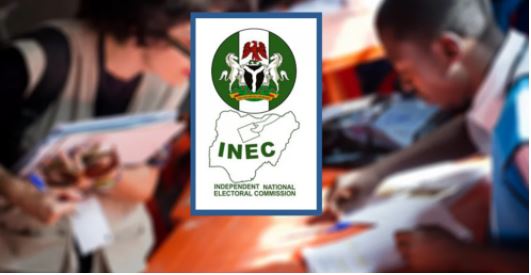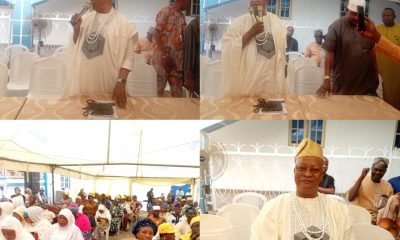News
INEC To Suspend Online CVR May 30

Ahead of the upcoming primaries of the various political parties, the Independent National Electoral Commission (INEC) Wednesday said it has decided to suspend the online registration 30th May 2022.
According to INEC, this would enable the online registrants to complete their registration physically at the designated centres before the exercise is suspended on 30th June 2022 when it would end ahead of the 2023 general elections.
INEC Chairman Professor Mahmood Yakubu stated this in Abuja at the second quarterly meeting with the Civil Society Organisations.
He said it would enable the commission to clean up the registration data, print the Permanent Voters’ Cards (PVCs) and compile the register ahead of the 2023 general election.
“As you are aware, the ongoing Continuous Voter Registration (CVR) exercise ends next month i.e. 30th June 2022.
“Both the online pre-registration as well as the physical registration at designated centres are taking place simultaneously. However, online pre-registrants would require time to schedule appointments to complete their registration physically at designated centers.
“For this reason, the commission has decided to suspend the online registration in the next three weeks i.e. 30th May 2022. This will enable the online registrants to complete their registration physically at the designated centres before the exercise is suspended on 30th June 2022.
“This will enable the Commission to clean up the registration data, print the Permanent Voters’ Cards (PVCs) and compile the register ahead of the 2023 general election,” Yakubu said.
While informing the CSOs that 14 activities listed in the 2023 general election’s timetable were being steadily implemented, the INEC chairman said “all the political parties in Nigeria have forwarded the schedules of their primaries to the commission and some have commenced the process of choosing their candidates by conducting ward and local government congresses.”
He also said: “The commission is required to make Regulations and Guidelines for the implementation of the provisions of the Electoral Act. These Regulations and Guidelines, together with the Constitution and the Electoral Act, constitute the electoral legal framework that govern the conduct of elections.”
He expressed delight that “the commission will finalise the Regulations and Guidelines next week to guide the conduct of future elections, including the forthcoming Ekiti and Osun Governorship elections as well as the 2023 General Election.”
To facilitate the participation of People Living with Disabilities (PWDs), the INEC boss stated, Section 54(2) of the Electoral Act makes provision for assistive materials for Persons with Disabilities (PWDs). This is another progressive provision of the new Electoral Act.
“Over the years, we have worked with the disability community in designing some of the assistive materials such as the Braille Ballot Guide and the provision of magnifying glasses for visually challenged voters and posters for the deaf.
“We are also working together to collect disaggregated data for PWDs to assist the Commission in optimally deploying the assistive materials. To deepen our collaboration, a meeting will be convened as early as next week with the disability community to discuss the implementation of the provisions of the new Electoral Act on inclusivity,” the INEC boss said.
He also said the lessons learnt on the use of the Bimodal Voters Accreditation technology from the most recent bye-elections had been taken into consideration as INEC prepares for the forthcoming Ekiti and Osun state governorship elections.
He added that the commission “has just finished the configuration of the BVAS for the Ekiti state governorship election. We will also undertake a mock voter accreditation exercise in Ekiti state ahead of the main election on 18th June 2022, the details of which will be announced shortly.”
-

 Opinion5 days ago
Opinion5 days agoDon’t Pull the Plug: Why Nigerians Are Pleading for the U.S. to Extend Its Police Training Program — and Why It Must Synergize With New Military Arrivals
-

 Crime4 days ago
Crime4 days agoVigilante Reportedly Shoots Colleague Dead In Plateau
-

 News3 days ago
News3 days agoRamadan: Osun Cleric Urges Compassion Among Muslims As Asejere Distributes Relief Materials To 537 Beneficiaries
-

 Crime5 days ago
Crime5 days agoMan Shot Dead In Ambush Along Jol-Sho Road In Plateau

